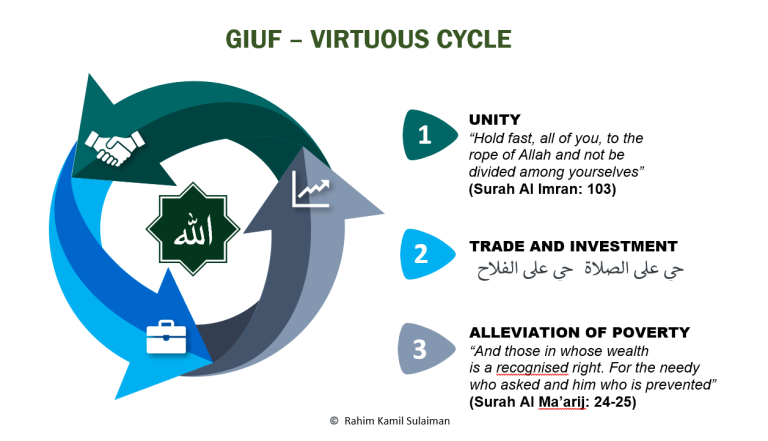Global Islamic Unity Forum
- To promote unity of the Ummah and world peace
- To promote trade and investment
- To alleviate poverty
Unity of the Ummah
The credo of GIUF is the unity of the Ummah and world peace through trade and investment and the alleviation of poverty. As in a virtuous circle (Fig: 1), each segment will reinforce the other. This will be made possible with a systems approach of applying Maqasid Shariah that is synthesized with an enterprise-wide implementation of the Balance Scorecard. The basis of the Roadmap for GIUF is to ensure that this organization will remain focused on strategy as the Islamic Ummah and humanity deals with rapid changes.

The Amman Message has been adopted by GIUF as the basis of unity of the Ummah, as proclaimed by a unanimous declaration of the Organization of Islamic Cooperation (OIC) on 8/12/2015.
In the Amman Message, ‘whosoever is an adherent to one of the four Sunni schools (Mazhab) of Islamic jurisprudence (Hanafi, Maliki, Shafi`i and Hanbali), the two Shi’i schools of Islamic jurisprudence (Ja`fari and Zaydi), the Ibadi school of Islamic jurisprudence and the Zahiri school of Islamic jurisprudence, is a Muslim. Declaring that person an apostate is impossible and impermissible’.
Shariah-Inspired Road Map
The overarching principles of the Maqasid Shariah will the interpretive approach of the Quran and Hadith. Since the objectives are long-range and desirous of impactful outcomes at national and international levels, the objectives of Maqasid Shariah are considered strategic goals.
The Roadmap of GIUF aspires to establish the principles of the Economy of Purpose, or Iqtisad, in which temporal worldly life becomes the good deeds that every soul will present to the Most High and the Most Merciful in the eternal Afterlife. In this purposive economy, wealth creation will be reinvested to fulfill a divinely inspired moral responsibility towards the right of the poor as enjoined in the Quran.
GIUF will partner with governments, non-governmental organizations (NGOs), corporations, civil societies, and individuals which share common objectives. Priority will be given to engagement with permanent and associate members of the Organization of Islamic Cooperation (OIC).
The Strategic Roadmap of GIUF and its Balance Scorecard will be published in “Azan”, our media of communication. The annual Balance Scorecard will include a Social Return on Investment (SROI) that goes beyond traditional economic evaluation tools, by considering value produced in all the three dimensions of development – economic, social and environmental
Strategy Management and Balanced Scorecard
In pursuing the three objectives of GIUF, we will engage with representatives of countries of the Organization of Islamic Cooperation and a substantial diaspora in several other countries. In the effort to be a strategy-focused organization, GIUF will be constantly guided by the command of Allah SWT, as we seek His Love and Pleasure:
“Then when you have taken a decision, put your trust in Allah; certainly Allah loves those who put their trust in Him” (Quran 3:149).
The greatest lessons of strategic thinking and action can be learned from the 23 years of the prophethood of Rasulullah SAW. These can be seen from the first hijrah to Abyssinia, the Hudaibiyah Treaty, the economic policies in Madinah, the letters to emperors of Rome and Persia, and the various battles that culminated with the conquest of Makkah.
Contemporary challenges will frame the strategic Roadmap of GIUF as a global forum to unite Muslims through trade and investment and poverty eradication. A virtuous circle will shape the Roadmap based on a comprehensive analysis using the systems approach of Maqasid Shariah within a strategy framework.
It is necessary for the operation and internal processes to be aligned with the overall strategy of GIUF as outlined in the mission objectives consistent with the overarching principles of Maqasid Shariah. The Balanced Scorecard will be this Shariah-inspired executive leadership’s preferred performance management tool.
Iqtisad : Economy of Purpose
Whatever the political and economic system, the primary objective of a government is to alleviate poverty in the general population. GIUF believes that poverty denies access to fundamental rights and emasculates the freedom of political, economic, social, and cultural choices. Slavery or slave-like employment is forced upon multitudes in the name of globalization of a liberal political and economic order.
In a purposive economy, the objective consistent with Maqasid Shariah is the freedom of worship of the One True God that no other Might or Power on Earth and the Heavens can challenge nor prevent. In Islam, worship is not limited to prostration and recitals. It also includes acts of charity, justice, and trust in all commercial activities. Shariah guides everything in life.
Work is Worship
Freedom of worship of One God and preservation of Religion are embodied in hifz al-din and repeated consistently in many Quranic verses. No wealth nor power can prevent man and all of creation from worshipping the One True God. This freedom to worship Him in rituals and compliance with Shariah in economic matters supersedes all other freedom sought in this earthly life. The Last Sermon of Prophet Muhammad embodies a comprehensive vision of core values needed in modern society.
Work became the existential essence of humanity when Adam and Eve were relocated from Paradise to a temporary life on Earth upon their seduction by Satan with promises of angelic life. This cosmic moment in sacred history also led to the Fall of a treacherous and defiant Archangel.
Since earthly life would no longer be the eternity of blissful Paradise, the relocation of humanity also came with the promise of Divine Guidance and exemplary leadership of Messengers (Baqarah:38). God promised this to every nation.
We said: Go forth from this all (of you); so surely there will come to you a guidance from Me, then whoever follows My guidance, no fear shall come upon them, nor shall they grieve.
Hence the history of an Islamic economic philosophy must begin with this ayah. The relocation of man necessitates work and observing his primordial covenant with God.
This incontrovertible departure from the erroneous theory of scarcity started with the myth of Hesiod. He suggested that the gods hid the abundance of creation from humanity, except the priest and the privileged aristocrats.
Family First and Sustainability
Shariah emphasizes the family for moral purposes and a sense of direction for the new generation. In marriage, maintenance of the family’s material resources and moral values are prerequisite and necessary elements (daruriyyat). Secular societies have largely abandoned the role of family and society in intergenerational continuity. Individualism replaces family values and the institution of marriage as the union of a father and a mother. Darul Islam is the last bastion against attempts to dismantle the sustainability of family values and societal morality.
GIUF’s emphasis on the revival of the institution of waqf is also consistent with hifz al-nasl. The intergenerational aspect of waqf is highlighted in the hadith known as “thawab ba’d al wafah (reward after death).
The gap is in the awareness of climate change and the impact of poverty as a structural economic issue. Despite Quranic emphasis to the contrary, Muslims still consider poverty as a necessary phenomenon and not the cost of wealth that can be claimed by the poor. On the other hand, climate change is not only about economic sustainability. It is primarily a religious issue of humanity that has abandoned a primordial covenant to safeguard nature.
Wealth and Inequality
Inequality in wealth distribution could result in poverty in sections of a community. The common perception of poverty is that of low income, whereas the emphasis should also be on the deprivation of necessities and elementary capabilities. The latter are often less documented, especially when the government focuses on basic needs in a populist agenda. When elementary capabilities are included in the three-stage model of development under Maqasid Shariah, widespread illiteracy, unemployability, malnourishment, morbidity and other societal failures could be brought into focus and rectified.
A new Oxfam report released in January 2023 at the World Economic Forum revealed that the wealthiest 1 percent grabbed nearly two-thirds of all new wealth worth $42 trillion created since 2020. This is almost twice as much money as the bottom 99 percent of the world’s population. A wealth tax or zakat of this phenomenal wealth would have released $1.05 trillion for poverty eradication, lifting as much as 400 million out of poverty. Excessive and iniquitous wealth is the cause of poverty as much as poverty is the cost of wealth. In compliance with rules under of zakat, 2.5% of wealth belongs to the poor. A grave punishment awaits zakat-dodgers in the Hereafter.
Truly, for every nation there is a trial, and the trial for my nation is wealth. Prophet Muhammad صلى الله عليه وسلم Instead of focusing on economics with theories of growth and pursuit of prosperity, GIUF intends to grow into a global forum on the aberration of poverty. As suggested in the Quranic verse, earthly existence should not be punctuated with fear and grief of deprivation caused by poverty.
Farewell Sermon
The immediate to medium-term global challenges will require Muslims to respond with our civilizational values based on principles derived from divine revelation (Quran) and Prophetic traditions (ahadith).
After thirteen years of prophethood in Makkah and ten years in Madinah, Rasulullah SAW delivered the Khutbah Wida or Farewell Sermon. Some of the salient points of the sermon can be highlighted as follows.
- Sacred Trust for Human Life and Property Rights
- Prohibition of Riba as Foundation of the Economy
- Safety in Religion.
- Family Life
- Unity and Diversity
- Finality of Prophethood
- Perfection of Religion and Allah’s Favour
GIUF will keep alive the remembrance of the powerful Khutbah Wida annually through thematic forums, talk shows, and op-eds in major newspapers.
Universal Engagement
In GIUF’s mission statement, Islam is the primary source of its worldview. However, the mission statement does not exclude engagement with adherents of other belief systems.
The maqasid for trade and investment must lead towards public good for the whole community and nations, especially for the vast masses “whose hearts will be turned”.
The economic outcome should manifest in justice and co-prosperity. Likewise, it should eliminate human exploitation, narrow the inequality gap from excessive wealth accumulation, and avoid wars and ecological catastrophes. GIUF will work with civil society and global thinkers of all creeds and persuasion to restore a religious weltanschauung.
Risk Free
Business Growth
Started business
Survival during wartime
Crisis and opportunity
50+ Branches
100+ Branches
Get Award
Our Expert Team Member will Help Your Business.
We are Very Happy to Get Our Client’s Reviews.

Alina Lora

Rohan Jho








